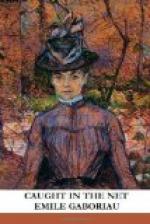“On hearing the facts of the case from Ludovic’s wife’s lover,” continued Mascarin, “my employers decided that if the tale was a true one, some mention of it would be found in the Baron’s diary; and thanks to the ingenuity and skill of certain parties, they have had in their possession for twenty-four hours the volume for the year 1842.”
“Scoundrels!” muttered the Count.
“They find not only one, but three distinct statements relating to the affair in question.”
The Count started again to his feet with so menacing a look, that the worthy Mascarin pushed back his chair in anticipation of an immediate assault.
“Proofs!” gasped the Count. “Give me proofs.”
“Everything has been provided for, and the three leaves by which you are so deeply compromised have been cut from the book.”
“Where are these pages?”
Mascarin at once put on an air of injured innocence.
“I have not seen them, but the leaves have been photographed, and a print has been entrusted to me, in order to enable you to recognize the writing.”
As he spoke he produced three specimens of the photographic art, wonderfully clear and full of fidelity. The Count examined them with the utmost attention, and then in a voice which trembled with emotion, he said, “True enough, it is his handwriting.”
Not a line upon Mascarin’s face indicated the delight with which he received this admission.
“Before continuing the subject,” he observed placidly, “I consider it necessary for you to understand the position taken up by the Baron de Clinchain. Do you wish, my lord, to read these extracts, or shall I do so for you?”
“Read,” answered the Count, adding in a lower voice, “I cannot see to do so.”
Mascarin drew his chair nearer to the lights on the table. “I perceive,” said he, “that the first entry was made on the evening after the—well, the accident. This is it: ’October 26, 1842. Early this morning went out shooting with Octave de Mussidan. We were accompanied by Ludovic, a groom, and by a young man named Montlouis, whom Octave intends one day to make his steward. It was a splendid day, and by twelve o’clock I had killed a leash of hares. Octave was in excellent spirits, and by one o’clock we were in a thick cover not far from Bevron. I and Ludovic were a few yards in front of the others, when angry voices behind attracted our attention. Octave and Montlouis were arguing violently, and all at once the Count struck his future steward a violent blow. In another moment Montlouis came up to me. ‘What is the matter?’ cried I. Instead of replying to my question, the unhappy young man turned back to his master, uttering a series of threats. Octave had evidently been reproaching him for some low intrigue he had been engaged in, and was reflecting upon the character of the woman. ‘At any rate,’ cried Montlouis, ’she is quite as virtuous as Madame de Mussidan was before her marriage.’”




